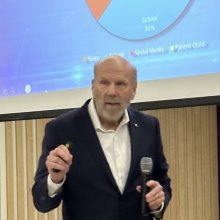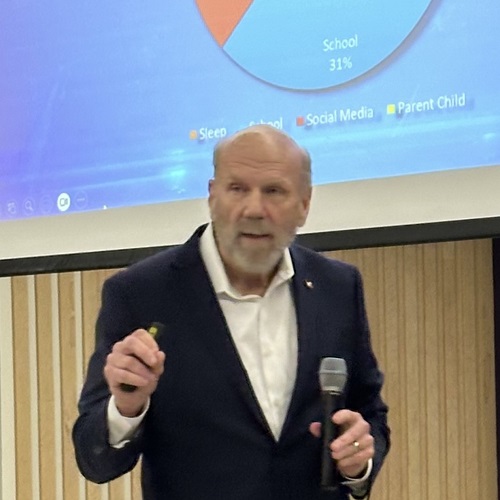
Stephen J. Smith of A Wired Family spoke to the DC community last night in a two-hour presentation designed to demonstrate the dangers of social media and technology and to help equip parents to safeguard their children.
In today’s world, students face social media addiction, cyberbullying, sextortion, exposure to predators, and a daunting expectation from their peers to present a highly inflated digital representation of themselves. These factors affect their self-esteem, mental health, and even their sleep.
Smith urged parents to take an active role in protecting their child from online dangers and offered tips to help.
SOCIAL MEDIA
Even the developers of major social media platforms recognize the harm their products can cause. More than half of social media executives do not allow their own children to use the very platforms they manage, and former Facebook president Sean Parker has expressed concern over what the network is “doing to our children’s brains.”
Smith encouraged parents be more intentional about monitoring their children’s use of Facebook, Instagram, TikTok and other platforms. If platform creators recognize the risks, we ought to as well.
"We do whatever we can for the physical health of our kids, but we sometimes we fail to see the need to care for those things which damage our children's mental health. We know to feed them fruits and vegetables and protein for their physical health - but when we give them unfettered access to social media and video games, we feed their brains the equivalent of potato chips," Smith said.
He recommended that children under the age of 16 not engage in social media. If it is permitted, accounts should be set up as private and the child’s real name and image should not be used. Parents should also set time limits and oversee access to devices where social media can be viewed.
PHONES AND OTHER DEVICES
Technology is not inherently evil, but parents are not always aware of the dangers when they hand their child a device.
He advised parents to refrain from buying a device for their child at all unless they are willing to monitor and manage that device and have the time to do so.
However, he did offer suggestions to mitigate the risks:
- Before the purchase is made, talk to your child about why the device is being purchased and what it will be used for. Make it clear that there will be expectations for its usage.
- Sign a contract with your child regarding the device’s use and do not allow yourself to be deterred from sticking to it.
- Limit where the device can be used. Phones should never be allowed in the child’s bedroom or other places where they can’t be supervised.
- Control access to the App Store. Only the parent should have the password to download apps.
- Use parental controls such as Circle to manage networks and Bark to manage apps.
REDUCING SCREEN TIME
The best way to protect a child from the dangers of the digital world is to limit their access to it. Smith suggested several ways to keep the phone or tablet from tempting your child to stay connected online, such as turning off notifications, turning off auto play on videos, and enforcing regular electronic fasts.
For more information on protecting your child online, Smith’s website offers helpful videos and articles as well as a “How To” section.
Smith posted two articles today to address questions that were broached at the presentation last night:
Are Video Games Addictive? - A Wired Family
How Kids Use Browsers to Access Apps & How to Stop Them - A Wired Family
View the news story by Dayton 24/7 Now at this link.






